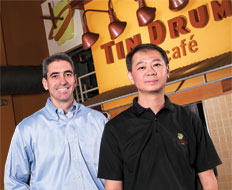Steven Chan’s business was at a crossroads last year. His Atlanta-based fast casual Tin Drum AsiaCafé launched in 2000, sold its first franchise in 2001, and was growing slowly due to Chan’s determination to keep it debt-free. At the beginning of 2012, Tin Drum had 10 franchises in Georgia and Alabama that highlighted its pan-Asian menu.
“It was at a point, however, where you think, ‘Do I want to stay in this mode of slow, steady growth, or does the concept have the ability to expand and really take off?’” Chan says. “I felt that I was coming up on a time when I had to make a decision on the business and figure out which way I wanted to go with it.”
Through a consultant contact, Chan was introduced to Scott Pressly, a partner with BIP Opportunities Fund, an Atlanta firm that invests in emerging, high-growth-potential companies.
“I met Scott and we began a friendship that became a partnership,” Chan says. “It’s been exciting so far. Besides the monetary infusion, there’s a sense that I’m not in this alone; I’ve got some experienced people watching my back, which is helpful.”
Chan’s experience mirrors that of many quick-serve entrepreneurs who choose a private investment partner when looking to expand. Unlike a loan, an investment deal tends to be more personal and can help the business become more profitable, experts interviewed for this story say.
“Scott and his team had worked with several quick-serve and fast-casual restaurants in the past, and they had some amazing resources and contacts,” Chan says. “That’s not something I would have been able to find right away on my own because I’ve been so focused on the day-to-day operations of the business.”
Forming a profitable investment partnership takes groundwork, or as it’s better known, “due diligence,” says Jeremy Andrews, CEO of Smart Money Entrepreneurs, a New York City–based private investment firm.
“It really is like a marriage; in some ways you’ve got to approach it that way,” he says. “First, you’ve got to determine if you can sustain your entrepreneurial drive while having one or more people as part of your business. That’s the most critical step. If you can’t, you’ve got to consider other options.”
Pressly says it can also be a hassle when brands assume they have a foolproof plan for successful expansion all on their own, with no need for help from outside parties.
“One of the red flags we see in meeting with entrepreneurs is when someone tells us, ‘All I need is $3 million and I’m set. I’ve got it all planned out,’” he says. “That makes us sit back and think. You have to wonder why it is this person is seeking a partnership if they think they’ve got it all planned out.”
He says an investment partnership requires collaboration, not just a silent partner. “I’m not Steven Chan’s boss and he’s not my boss. But we’ve got this mutual interest in seeing Tin Drum do very well,” Pressly says. “I’m going to do everything I can to see that he gets what he needs to succeed.”
While banks often focus primarily on businesses’ collateral and concept, private investors are usually just as concerned about the entrepreneur. Pressly says that person is critical to an emerging business’s success.
“That’s why we want the entrepreneurs we partner with to stay entrepreneurial,” he says. “We don’t oversee them; we’re their sounding boards to bounce off ideas and help coach them.”
For operators, finding an investment partner can sometimes be tricky, especially in the restaurant industry, where investors commonly don’t understand what the hospitality industry is all about, Andrews says.
“There are people with these great restaurant concepts and backgrounds and, at the same time, a lot of investors are wary of the industry because of the work involved and the failure rate.”
He says brands should look for investment firms and partners that have worked with hospitality businesses and may have a niche with similar industries. People familiar with the industry will probably know your concept before you engage with them, he adds, which is a good thing.
However, while a financial investor also shares a brand’s desire to see the business succeed, there may be a divide in how both sides view what success means, Andrews says.
“It’s about talking upfront about the exit plan and knowing what the other person wants at the end of a successful venture,” he says. “In general, that means there are two outcomes to discuss: selling franchises or selling the company to a larger concern.”
Once the papers are signed and the deal is done, partners must determine how to carry out their roles effectively, says John Hendricks, a private investment broker based in San Francisco. “If you’ve both done things right, you both know what you’re going to do before the papers are signed,” he adds.
“Everyone has a job to do, and if you’ve been the CEO, you’re still likely going to be the CEO,” he says. “But you may be working with your partner on expansion plans, and he or she is going to focus on that while you’re presiding over operations and marketing. You don’t want any surprises, and you want each person involved to be handling their area of expertise.”
Should the business take off or fall flat after an influx of capital, partners must carefully work together to make major strategic decisions, Hendricks says. “Thinking ahead and looking at all of the possibilities and talking about them will help alleviate a lot of concerns,” he says. “It’s always best to know what’s coming down the road.”
In many investments, partners draw up a timeline that clearly spells out what actions will be taken by each side if and when particular benchmarks are hit, Andrews says.
“You may have a partner who brings in nine months’ worth of capital,” he says. “The contract may say that if by month five you’ve burned through X amount of capital and your sales are below Y, we pivot to another strategy. That kind of forward thinking takes away a lot of business-partner conflicts.”
For Tin Drum, its expansion plans with the help of the BIP partnership include franchising throughout the Southeast, particularly in college towns where the chain has proven popular.
“With our bigger budget, I feel more comfortable going deeper into departments like marketing and IT,” Chan says. “In the past, when it was just me, I often felt spread too thin. Now that I have this partnership, I can do what I’m good at, and with Scott, we’ll really see the business grow.”







